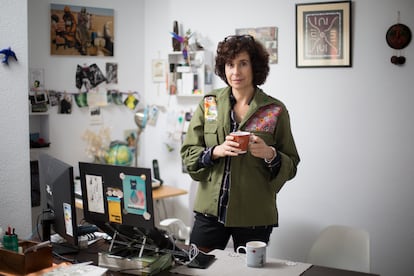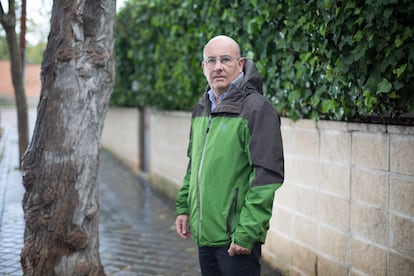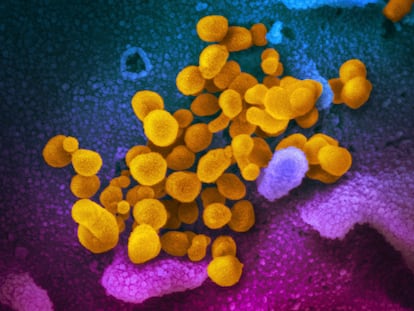Three years without definitive treatments: The torture of living without smell due to long Covid
An estimated 5.6% of patients suffer from anosmia more than six months after passing through the acute phase of the disease

Like many before her, Elena Pérez found out that she had Covid-19 because she stopped smelling food. One day in January 2021 she started to feel bad. At first she thought she had bronchitis, until she realized that she had completely lost her senses of taste and smell. “It was the most common symptom back then. Everyone identified it as proof that you had Covid,” she recalls. What she could not imagine was that to this day, almost three years after that diagnosis, she would still not recognize many of the most basic smells that she had known since childhood. “Everything smells like sewers, tobacco, or burning. Other times, I smell things that are not there,” she explains.
Like Pérez, it is estimated that in 5.6% of patients infected with the coronavirus, olfactory alteration persists beyond six months, according to a scientific review by the University of Singapore. Anosmia and ageusia — the loss of smell and taste, respectively — are two common symptoms of long Covid, the disease suffered by people who have recovered from the infection, but continue to have some symptoms even years later. “It is not correct to talk about after-effects, because in this case the effects are sustained over time and do not decrease in intensity,” says Jordi Matías-Guiu from the San Carlos Clinical Hospital in Madrid.
The neurologist explains that unlike the demographic profile of people who have had the disease in the acute phase, patients with long Covid are usually between 30 and 60 years old, which means that the day-to-day consequences are more serious and can even prevent them from working. This is the case of José Méndez, a 50-year-old economist, who was made redundant from this job while he was on sick leave due to long Covid, which he has had since May 2021. In addition to the incessant fatigue — he can barely talk on the phone while walking because he gets short of breath — he has not recovered his sense of smell either.
“Anosmia is something that does not limit you as much as other symptoms, but it can have very serious and even life-threatening repercussions,” says Méndez, who is also the president of the Madrid Long Covid Association. “If something is burning, I don’t smell it. Even if a there was a fire behind me, I wouldn’t notice. A few months ago I left the gas on at home and I didn’t find out until my wife returned. Luckily, the window was open and nothing more serious happened.”
The exact causes that lead to some patients not recovering their sense of smell so many months after infection are still unknown. “It seems that the Covid virus has a specific affinity to infect the cells of the olfactory epithelium and its neurons, which directly affects smell and taste,” explains Joan B. Soriano, an epidemiologist at the Hospital La Princesa in Madrid and WHO consultant in the working group that defined long Covid. According to an autopsy study published in the journal Nature, the virus has been detected in the olfactory bulb of patients who died from acute Covid and long Covid.

Soriano estimates that, since the outbreak of the pandemic, the percentage of patients who have alterations in smell and taste in the acute phase is 40%. However, in most cases this loss is temporary and is completely recovered within a few days or weeks. “In our long Covid outpatient clinic, more than 700 patients have been followed, some since April 2020, and less than 10% have lasting alterations in taste or smell,” the epidemiologist acknowledges. However, although anosmia affects a minority of the population and cannot be considered one of the more debilitating symptoms, the doctor warns that it can lead to serious emotional problems, and even depression and anxiety. “It may cause discomfort or self-consciousness, especially around mealtimes. It is essential that patients seek medical guidance to investigate the underlying cause and seek solutions,” adds Soriano.
Olfactory retraining
Carmena Zamora comments that she has been trying to remember what a beef steak tastes like since the first wave of the pandemic. Her entire family fell ill, but only she and her daughter have still not recovered their sense of smell or taste. “You have the memory of how it tasted. But when you try it and it doesn’t taste like anything, it’s very annoying. You can’t enjoy meals with friends, or foods that you used to like and that now smell horrible,” Zamora says. She has been doing aroma therapy for years, but says she does not notice any improvement. “The worst thing is that sometimes you forget that you have certain limitations. On occasion, I have heated up some food that I had left out of the refrigerator, and I have eaten it without realizing that it was bad. You don’t smell it. It’s very frustrating.”
Today, olfactory retraining is the only therapy that is proven to have any effect, says ear, nose, and throat specialist Blanca Mateo, who works with patients with long Covid at Hospital La Paz in Madrid. There are not many advances in the field of medicine either. The Japanese pharmaceutical company Shionogi has developed an antiviral drug — currently in phase two of the clinical study — that has proven to be effective in accelerating the recovery of smell and taste, but only if taken in the first few days of the infection.
Olfactory rehabilitation treatment is very simple, but requires a lot of patience. “The results can be very different depending on the type of patient. Some are going to do well no matter what they do. Others are highly motivated and successful. However, there are also those who try for a long time without seeing any improvement and eventually get tired,” explains Mateo. Four essences are chosen from the four different groups of smells — menthol, citric, aromatic, and floral — and twice a day the patient has to do some exercises to be able to recognize the aromas with their eyes closed. Once they have managed to memorize these essences, they choose new ones and start again.
Soriano warns, however, that if anosmia is related to damage to the olfactory system in the brain or to the olfactory cells in the nose, full recovery may be impossible. “Apart from treating nasal infection with antibiotics or nasal obstruction with corticosteroids, there are no specific drugs to restore smell. It should be remembered that vaccination and revaccination is one of the few protective factors against the appearance and worsening of long Covid,” he says.
Sign up for our weekly newsletter to get more English-language news coverage from EL PAÍS USA Edition









































